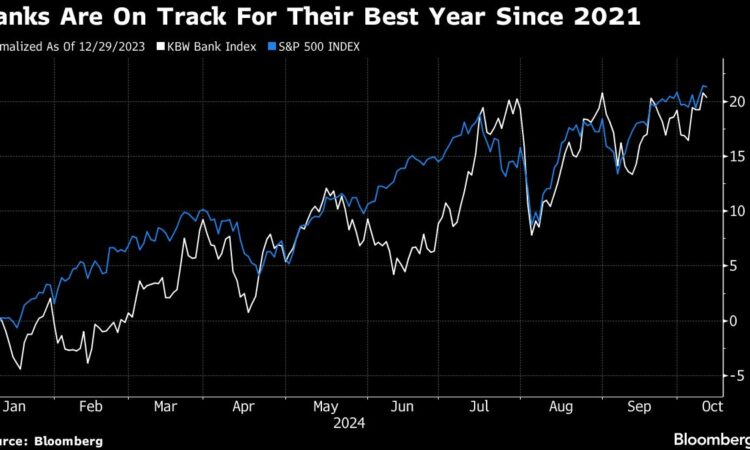
(Bloomberg) — Wall Street is poised for a glimpse into the outlook for the biggest US banks as the Federal Reserve starts dialing back interest rates and uncertainty continues to shadow the economy.
Most Read from Bloomberg
JPMorgan Chase & Co. and Wells Fargo & Co. kick off the the quarterly earnings-report cycle on Friday, followed by Citigroup Inc., Morgan Stanley, Goldman Sachs Group Inc., and Bank of America Corp. next week.
Banks provide a good read on the state of both consumers and other companies, making their quarterly reports a crucial part of the earnings season. US bank stocks jumped almost 10% in the third quarter amid optimism around policymakers’ rate-cutting cycle and the resilient state of the economy, turning the latest update into a test of whether expectations ran too far.
So far the going has been good for banks. Second quarter earnings were the second best among S&P 500 sub-industries with banks notably trouncing the S&P 500 Index as a whole, according to Bloomberg Intelligence data. The focus is now on how net interest income, loan and deposit growth, credit quality, and consumer spending resilience will fare as US interest rates come down from a more than two-decade high.
Bank stocks have been on a roll this year, with the KBW Bank Index rising almost 21%, roughly in line with the S&P 500 — no small feat considering the broader benchmark has seen its gains largely powered by tech giants like Nvidia and Apple. Still, the rally for banks has pushed them back around the peaks seen in late July.
Analysts are split pretty evenly between buy and hold ratings. The split sets the tone for the earnings ahead; half expect the going to get better, while the other half have signaled caution.
“Investors still seem optimistic about 2025 prospects, but with lingering near-term anxiety on net interest income,” said Piper Sandler’s analyst R. Scott Siefers.
“In order words,” he wrote in a note, “while investors are optimistic about next year’s prospects, the path to get there could still be bumpy.”
In September, JPMorgan President and Chief Operating Officer Daniel Pinto sent shares tumbling after warning investors that analysts are being too optimistic in projecting next year’s expenses and net interest income as rates start coming down. Pinto said that the net interest income estimate of $89.5 billion was “not very reasonable” given interest-rate expectations, and the figure “will be lower.”
To be sure, the Fed’s half-percentage-point cut in September occurred too late to have any material impact on third quarter interest income. As a result, attention will fall heavily on the outlook for the fourth quarter and beyond. To make matters more complicated, stronger-than-expected jobs data earlier in October has some thinking that rates will be cut slower than anticipated.
“We anticipate that the benefits from a lower rate environment should become more apparent for banks in coming quarters, but in the near term, we expect another quarter of mixed results in 3Q,” Wedbush Securities Inc analyst David Chiaverini writes in a note ahead of earnings.
The drop in interest rates isn’t entirely negative to banks, since it can also fuel an increase in bond sales, consumer borrowing, trading and other activity that fuels profits. JPMorgan analyst Vivek Juneja said investment-banking fees may be one bright spot.
“We view this as a major positive for M&A activity, as lower debt financing costs should incentivize sponsors to deploy dry powder and corporates to deploy excess capital,” Juneja wrote in a note. He expects major banks like Bank of America, Citi, and Wells Fargo to benefit from strong market-related revenues such as investment banking. “These banks should also benefit relatively more in credit card losses with lower unemployment,” he said.
October’s earnings are bookended by the start of the rate cutting cycle and the US presidential election in November. Some of the caution from analysts and investors will likely ease once these remaining questions are answered.
“Banks never trade well amid uncertainty,” says Jason Goldberg U.S. Large-Cap Bank Equity Analyst at Barclays PLC. “Getting through the election and having some clarity will help almost irrespective of the outcome.”
Ultimately, lower rates are expected to provide another spur to the economy and allow the US to avoid a recession, which should positively affect banks in coming quarters if consumer spending and loan growth picks up.
“What matters most is overall economic growth, at the end of the day bank stocks are a reflection of the economy,” Goldberg added.
Most Read from Bloomberg Businessweek
©2024 Bloomberg L.P.
